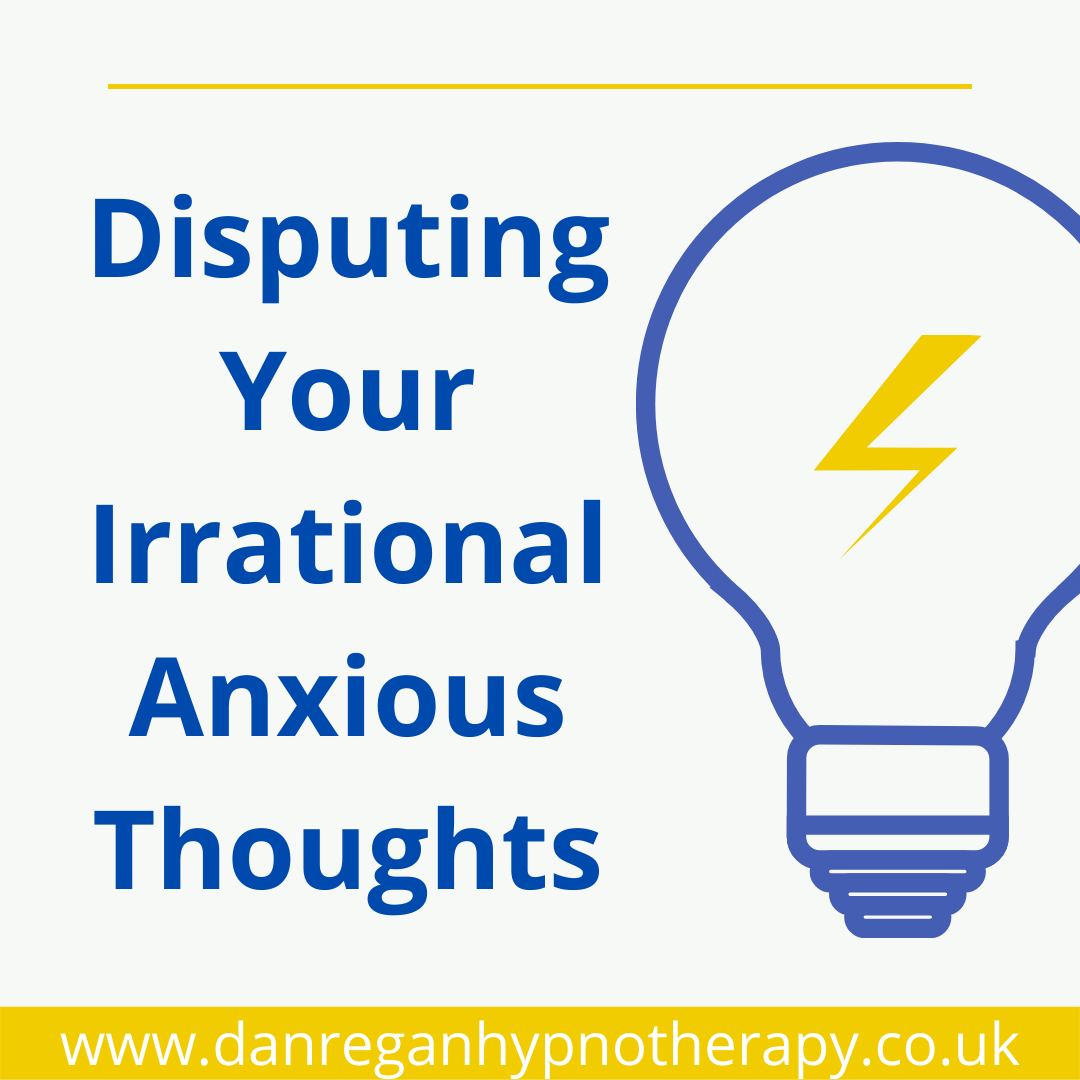Disputing Your Irrational Anxious Thoughts
There can be few greater simple pleasures than spending half an hour or so reading at night before going to sleep. Ever since I was a teenager, I’ve loved reading detective stories, with anything containing Sherlock Holmes always being a favourite (in fact, I seem to recall that I based my English GCSE exam story composition upon a Sherlock Holmes story I’d been reading beforehand!). Agatha Christie’s Poirot is another favourite, and I love anything in the British Library Crime Classics collection.
In these stories there’s no need for excessive violence, there are no computers or mobile phones or DNA to call upon, and it’s all based upon deduction and reasoning to bring the plot to a successful conclusion. Perhaps it was this love of the logic and rational thinking and reasoning that led me to study my law degree (or maybe it was watching LA Law on TV, if you’re old enough to remember that one!).
Poirot calls upon his ‘little grey cells’ to evaluate, analyse and solve cases, and there’s perhaps no detective more famous that Sherlock Holmes for rational thinking and calling upon the facts (although he never actually says ‘Elementary, my dear Watson’ in any of the Conan Doyle stories).
And so I was delighted and excited recently when I found out that my daughter’s English class were studying Victorian Crime and Detective Stories, and particularly Sherlock Holmes’ stories. I’d have loved that at her age, and even now I would happily go and sit at the back of the class so I could listen in! Ah here, I thought, was a shared thing that my daughter and I would be able to discuss and dissect with a shared passion for old detective fiction. Only it turned out she wasn’t that bothered about the stories, so that was the end of that!
So why am I talking about these great-thinking detectives here today? It’s because very often, inside our own minds, our thinking gets distorted, generalised, embellished, catastrophised and we suffer from all sorts of thinking errors and biases. We can jump to conclusions, give meaning to things, make assumptions about what other people are thinking, make erroneous predictions, catastrophise and imagine and create all sorts of worst-case scenarios. Emotions like anxiety can lead to these kinds of negative and irrational thoughts, and the thoughts (which may or may not be accurate) can create emotions like anxiety.
If you struggle with anxiety then you will be familiar with the overthinking, worst-case scenarios and ‘what if’ thoughts. Your anxiety can latch onto a train of thought and before you know it, it has been amplified and magnified inside your head and your anxious feelings increase. An initial thought can move down that rabbit hole of thinking that moves further and further away from the current situation, and where things get worse and worse in your mind.
So there is certainly benefit in bringing thoughts back to the present, and to the facts, rather than letting emotions like anxiety, stress, fear and worry take over. To take control over our thinking and feel better in ourselves, perhaps we all need to think a bit more like Sherlock in these moments when he said, “whatever is emotional is opposed to that true cold reason which I place above all things” (Sir Arthur Conan Doyle, The Sign Of Four).
Yep, I read all of the Sherlock Holmes short stories that my daughter’s class were given to study (not so certain that my daughter actually read them though!)…
Irrational Anxious Thoughts
When you feel anxious, worried or fearful, that emotion drives your imagination and your thinking. Rather than ‘true cold reason’ and logical thinking, your emotions drive your thinking into all sorts of unwanted and unpleasant directions. Your mind scans for potential, perceived threat and danger, and you experience all the unpleasant physical feelings of anxiety and worry. You may know that a lot of your anxious thoughts are irrational and aren’t logical, but those unhelpful thinking patterns take over.
What’s more, these sorts of unhelpful thinking patterns can impact upon many areas of your life. you may find yourself thinking in all or nothing terms (black and white thinking), catastrophising, missing other perspectives, inflating small things into bigger things, discounting positives or contract evidence, blaming yourself or others, mind reading of trying to predict the future. And all of these can move you away from facts and an accurate account of the current reality, and into areas of anxiety, worry and annoyance.
Anxiety, anger, worry about what other people think, low self esteem and many other issues involves thinking distortions and errors that can become a habit of how you think about yourself and other people, or about certain situations and circumstances.
All too often we fill in gaps, give meaning and create things in our minds based upon limited information, uncertainty or emotion. You then treat your thoughts as if they were facts and an accurate account of things (which they may or may not be) and experience feelings and emotions to go with it that drive how you behave.
As Sherlock observed, “It is a capital mistake to theorise before one has data. Insensibly one begins to twist facts to suit theories, instead of theories to suit facts” (Sir Arthur Conan Doyle, A Scandal In Bohemia).
Anxiety and worry take one initial (often imagined or made up) thought, which may be about something that is possible but not necessarily probable, and then takes your thoughts further and further away from the here and now, and deeper into more and more remote possibilities (which may nevertheless seem very real inside your mind). Anxiety twists everything towards the worst case, overlooking how many things would have to happen for that to occur, forgetting all the times that similar anxious thoughts have led to nothing, and ignoring your ability to take action and to proactively deal with whatever comes your way.
Disputing Anxious Thoughts
Whatever unwanted direction your anxiety takes your thoughts and imagination, it is possible to develop the ability to habitually reign it back in. Rather than letting worry and anxiety take your thoughts far away from the present and how things are now, you can start to dispute and challenge them to undermine them.
Follow these steps to start disputing and interrupting those irrational anxious thoughts that tend to lead to anxiety and other unwanted thoughts and feelings:
1. Ensuring you are sitting somewhere quiet, take a deep breath and close your eyes. If you know self-hypnosis techniques you could incorporate these here. Start to extend your out breath and say the word ‘relax’ to yourself on every breath out. You could tense and relax each part of your body or tell yourself that each part of your body is relaxing. You could imagine a calm colour or sensation spreading through you, or fill your mind with a relaxing sound. You could engage your imagination and imagine being in a remembered or created place of calmness, seeing the sights and hearing the sounds. Or you can draw upon and utilise any other ways that allow you to feel comfortable, calm and relaxed. Your aim here is just to feel as safe, calm and comfortable as you can right now.
You can also use either of the processes covered in these articles: The Eye Fixation Induction In Hypnosis, Mindfulness For Anxiety, Stress and Promoting Mental Health
2. Start to become aware of your entire body as one, from the top of your head down through your body and into the tips of your toes. Just aim to be aware of your entire body as one right now. You don’t need to try to change anything and you don’t need to try and stop anything from changing. Just notice what you notice, feel what you feel in your body and be aware of your entire body as one, with a sense of contentment.
3. Now, move your awareness to your breathing. Notice the sensations of your breathing: the rise and fall of every breath that happens so automatically. The feeling of your chest expanding, and then relaxing. Notice the sensations anywhere and everywhere caused by your breathing. Just tune in and watch your body breathing. If your mind wanders at any point you can gently bring your awareness back to your breathing.
Tune in and notice the sensations of your breathing as you let your body do the breathing, almost as if you were watching someone else breathing, or a bird in a tree breathing, or like you are watching a perfectly working machine. Continue to imagine you are breathing in calmness and becoming increasingly calm, balanced and at ease as you breathe out.
4. Now, start to become more comfortably absorbed in the sensations of your body. Become aware of the sensations in your arms, in your chest, in your stomach and legs and then into each and every part of your body. You can notice whether each part of your body feels warm or cold or somewhere in between, whether you feel lightness or heaviness or something in between, and just be content to notice what you notice as you let your awareness go deeper into your body. And throughout you can bring your awareness back to your breathing, the rise and fall of every breath that happens so automatically.
5. Then begin to gently turn your attention deeper, into your mind and towards your thinking. Become aware of the thoughts in your mind. Just notice, watch and observe your thoughts, the things you say to yourself, any images in your awareness, deliberate thoughts and the things that may just be drifting through your mind, thoughts at the back of your mind and those in your current awareness.
Allow each thought to come and go in its own time, without trying to remove those thoughts or to change those thoughts, just observe them and just watch them happening. Watch your thoughts as they come and go, thought by thought, moment by moment, all the while remaining calm and comfortable.
6. Then, as you continue to tune into your mind and into your thinking, begin to deliberately observe and bring to mind a worrying or anxious thought that you may have been thinking recently and which led to unhelpful thinking processes and unwanted feelings. Bring to mind and observe that thought, almost as if you could hold it out in front of you and just look at it (you can imagine it on a screen or on a chalkboard in front of you), or you can describe to yourself what you were thinking.
As you observe the anxious thoughts which before now may have led your imagination down all sorts of anxiety-provoking spirals, now begin to deliberately challenge, dispute and undermine it through logical thinking and rational reasoning.
Almost as if you were adopting the mindset of Sherlock Holmes or Hercule Poirot, start to consider that thought whilst asking yourself questions such as:
– Is that thought completely logical and rational?
– What reason is there to believe that thought is accurate?
– Where is the evidence to support it being accurate and certain to happen?
– Could I be wrong in thinking this? What else might happen?
– Is this a fact or am I making it up in my head out of habit?
– Are things really the way I’m telling myself that they are?
– Would someone else agree with my evidence, thinking process and reasoning here?
– What might someone else’s view of this, or attitude towards this, be?
You don’t have to use all of these questions; only use them enough so that you check the robustness of what you are thinking, rather than letting an anxious thoughts run away and escalate, when the starting point wasn’t logical, rational or set in stone.
If you are thinking the worst-case scenario then you can also consider how likely that is to happen (it may be possible but that doesn’t mean it is probable or likely). Then asl yourself what the best-case scenario is and how likely that is to happen, and then consider realistically, what is most likely to happen. You can also consider what you would do if the worst did happen, after all, you don’t have to just passively suffer and you can take action to mitigate it, or at the very least to manage your own thoughts and emotions through it.
7. Having disputed, undermined and challenged that previous thought, imagine sending it away into nothingness and clearing it from your mind. And, at the same time, start to adopt more helpful, encouraging and supportive thoughts in your mind. As you think of the thing that you were previously anxious or worried about, start to think more clearly, logically and rationally about it.
Inside your mind, start to remind yourself that whatever happens, you’ll deal with it and be ok. You can remind yourself of previous occasions when you’ve handled and come through challenges and how you are always stronger and more capable than you think you are. And you can simply repeat to yourself how you are now more calm, confident and in control. Whatever your thoughts here, make them positive, supportive and encouraging and think them in a way that you believe and that means you know you can handle any challenges that come your way.
8. Tell yourself that the more you practice challenging and disputing any irrational thoughts that come into your mind, rather than letting them build and grow, the easier you find it to do this on the go, in day to day situations.
9. Then, having done so, and knowing that it’s just going to happen, and knowing that you’ve got this, now, count up from 1 up to 5 inside your mind, open your eyes and reorientate yourself to your surroundings.
Practice this process regularly and then remind yourself of your ability to call upon it whenever needed in daily situations. Rather than letting an initial anxious or troubling thought spiral and magnify inside your head, all the while ramping up any anxious feelings, start to adopt a mindset where you critically evaluate the things inside your own head.
A lot of the time the things we think are just from anxiety driving our imagination and leading us to ‘make up’ and imagine the worst. So instead, start to hold up that anxious thought and appraise it and challenge it, and then, having recognised it is irrational, orchestrate your thoughts and send them in a more positive direction. Adopt the mindset of Sherlock Holmes and ensure that, when faced with a problem, you start to value, above all else, true cold reason.
To your health and happiness,
Dan Regan
Hypnotherapy in Ely & Newmarket
Struggling with anxiety, stress, worry and fear and need some help? Find out how I can help with a Complimentary Hypnotherapy Strategy Session. Learn more here: Appointments
Find out what dozens of other people have said after their hypnotherapy sessions with Dan: Hypnotherapy Testimonials
And check out these powerful hypnosis downloads that can start helping you right away with anxious thoughts, confidence and more: Hypnosis Downloads






0 Comments